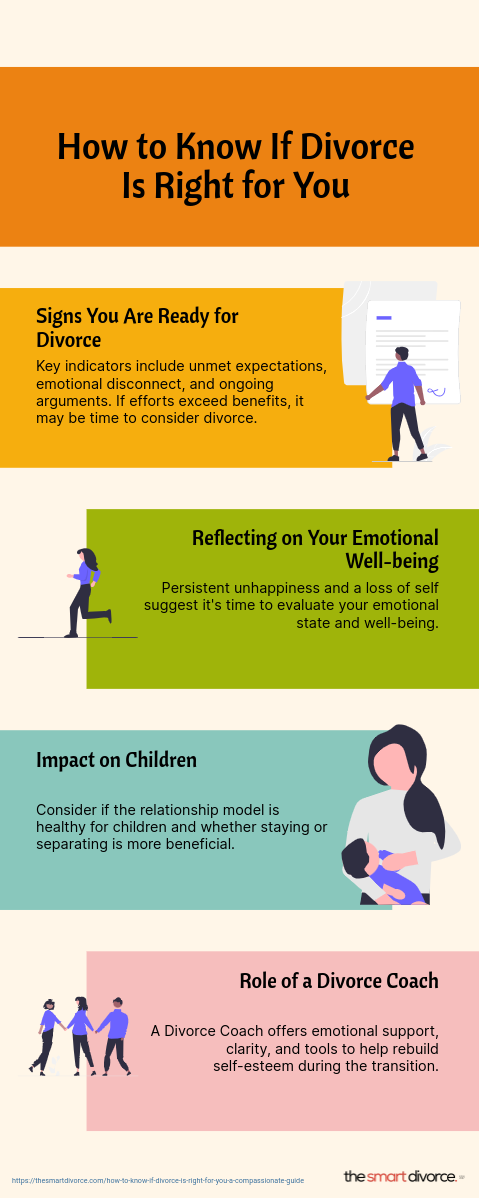Deciding to divorce is one of the most challenging and emotional decisions you may face, which is why Relationship assessment is crucial. It’s a personal journey filled with uncertainties, fears, and concerns, especially when children are involved. Knowing if divorce is the right choice requires introspection and courage. This guide provides support as you navigate these tricky waters, helping you recognize the signs that it might be time to consider ending your marriage and explaining how a Divorce Coach can assist you through the process.
Every marriage has its ups and downs, but some signs suggest it might be time to consider whether staying in the marriage is your healthiest choice. These signs aren’t about placing blame but are pivotal in recognizing patterns of marital conflict, indicating deeper, unresolved issues.
- Unmet Expectations
- Consistent Disappointment: You’ve repeatedly communicated your needs and expectations to your spouse. Despite this, your spouse refuses to meet these needs or seems incapable.
- Emotional Disconnect: You feel your emotional needs are not being met, and there’s a growing distance between you and your spouse, impacting your psychological wellness.
- Repetitive Arguments
- Déjà Vu Conflicts: You keep having the same arguments over and over. There’s no resolution each time, and the issue resurfaces, causing frustration and hurt.
- Broken Promises: For example, your spouse might promise to make time for the relationship, like scheduling a regular date night, but fails to follow through repeatedly. This cycle of marital conflict leads to a loss of trust and increased resentment.
- Efforts Exceeding Benefits
- Imbalance in the Relationship: You feel like you are putting much more into the marriage than your partner, and the emotional return is minimal.
- Thoughts of Independence: Being single or starting over feels less daunting and more liberating than staying in a stagnant or unhappy marriage.
Reflecting on Your Emotional Well-being
Determining if divorce is suitable also means reflecting on your emotional state.
- Persistent Unhappiness: Assess if divorce is necessary if you feel consistently unhappy, unfulfilled, or emotionally neglected, as it might be time to evaluate how these feelings impact your well-being.
- Loss of Self: If being in the marriage has caused you to lose a sense of who you are or hindered your personal growth, these signs deserve attention.
Should You Stay for the Children?
Many people stay in unhappy marriages for the sake of their children. While the intention is to protect them, it’s essential to consider the following:
- Modelling Healthy Relationships: Ask yourself, “Am I modelling a relationship that I want my children to replicate in their future?” Children learn about relationships by observing their parents, which can influence their future emotional stability. Staying in a toxic or unfulfilling marriage may teach them that this is acceptable behaviour.
- Emotional Environment: Consider whether the home environment is filled with tension and conflict. This can profoundly impact children’s emotional and psychological well-being.
How to Decide If You Should Get a Divorce
Before making any decisions, explore whether reconciliation is possible and whether both partners are willing to do the necessary work.
- Communication: Are you both willing to communicate openly and honestly? Effective communication is crucial for any relationship, especially when resolving deep-seated issues.
- Professional Help: Have you considered marriage counseling or therapy? Sometimes, an unbiased third party can help facilitate productive conversations and provide tools to rebuild the relationship.
- Commitment to Change: Are you and your partner committed to making changes? With mutual commitment, achieving meaningful improvement is easier.
How a Divorce Coach Can Help You
Deciding if divorce is appropriate isn’t just about the practicalities; it’s also about emotional readiness. A Divorce Coach can be incredibly beneficial in guiding you through the separation decision process. They provide:
- Emotional Support: Navigating the emotional turmoil of divorce can be overwhelming. A Divorce Coach offers a safe space to express your feelings, helping you process emotions like grief, anger, and fear.
- Clarity and Confidence: Through coaching, you can gain clarity about your feelings and the reasons behind your decision. This helps build the confidence needed to make a choice that aligns with your well-being.
- Tools for Self-Esteem: A Divorce Coach can provide tools to rebuild self-esteem and self-worth, incredibly if the marriage has been emotionally draining.
Key Questions to Ask Yourself Before Deciding on Divorce
Before making a final decision, ask yourself these questions to help you know if you should divorce:
- Am I Truly Unhappy, or Is This a Rough Patch?
- Evaluate if divorce is the answer by reflecting on whether your feelings of dissatisfaction are temporary or if they are deep-rooted and persistent.
- Have I Done Everything Possible to Save the Marriage?
- Think about whether you have exhausted all options, such as counselling, open communication, and making compromises.
- What Do I Want for My Future?
- Consider your goals and aspirations. Do they align with staying in the marriage, or do you see yourself happier apart?
- How Will Divorce Impact My Children?
- Think about the emotional and psychological effects on your children, but also consider whether staying in an unhappy marriage is a better alternative.
- Am I Prepared for the Challenges of Divorce?
- Understand that divorce is not just an emotional decision but also involves practical aspects like financial stability, housing, and co-parenting.
Addressing Common Misconceptions About Divorce
Many people fear divorce due to common misconceptions, such as:
- Divorce Means Failure: Divorce is not a sign of failure but a recognition that something isn’t working and that both parties deserve to seek happiness and fulfillment.
- Staying Married Is Always Better for the Children: While maintaining a stable home is crucial, staying in a toxic environment can be more harmful than co-parenting separately in healthy ways.
- You Will Be Alone Forever: Many people find happiness and even new, fulfilling relationships after divorce.
Final Thoughts on How to Know If Divorce Is Right
Deciding to pursue a decision to part is not a decision to take lightly. It requires deep reflection, emotional readiness, and the courage to prioritize your well-being. Recognizing that it may be time to move on, asking yourself the right questions, and seeking support from professionals like Divorce Coaches can make this challenging process more manageable. Remember, you are not alone, and seeking a path that leads to a healthier and happier life is okay.
At The Smart Divorce
At The Smart Divorce, we understand how difficult it can be to decide if divorce is the right step. Our compassionate Divorce Coaches, Sarah Bates, a Certified Divorce Specialist (CDS), and Ken S. Maynard, a Certified Divorce Financial Analyst, support you every step. If you need more time to feel overwhelmed and unsure about your next steps, consider scheduling a Complementary Get-Acquainted Call with us. We offer personalized coaching sessions via telephone or Zoom to help you gain clarity and confidence in your decision-making process. Schedule your free call today and take the first step towards a more fulfilling future.
Bullet-Point Summary: 11 Key Takeaways
- Recognize Signs of Divorce: Unmet expectations, repetitive arguments, and imbalance in effort can be indicators.
- Emotional Well-being: Persistent unhappiness and loss of self are critical signals to consider.
- Impact on Children: Evaluate if the relationship model benefits or harms children.
- Possibility of Reconciliation: Open communication and marriage counseling may help rebuild the relationship.
- Role of a Divorce Coach: Provides emotional support, clarity, confidence, and tools for self-esteem.
- Ask Key Questions: Reflect on your happiness, efforts, future goals, children’s impact, and readiness for challenges.
- Challenge Misconceptions: Divorce is not a failure; staying together isn’t always best for the children.
- Prepare for Divorce: Consider financial stability, housing, and co-parenting.
- Support Systems: Build a network of supportive friends, family, and professionals.
- Professional Guidance: Seek therapy or coaching for a smoother transition.
- Take Action: Reach out for a free consultation with professional support to explore your options.


